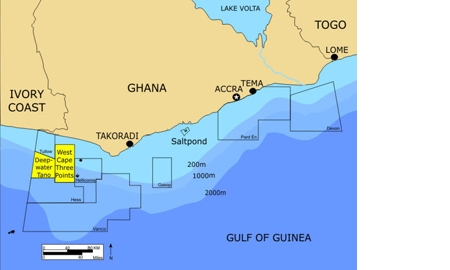
Ghana is a key member of the West African Power Pool (WAPP) project, a collaboration of the national electricity companies in the Economic Community of West African States (ECOWAS). The project seeks to significantly improve the access to more stable and reliable electricity supplies, and ease potential exports of future energy surpluses. Three main public utility companies run the electricity sector in Ghana: the Volta River Authority (VRA), Electricity Company of Ghana (ECG) and Ghana Grid Company (GRIDCo). The VRA is responsible for the generation and supply of electricity, and GRIDCo is responsible for its transmission. The ECG and VRA’s Northern Electricity Department (NED) then distribute it to consumers.
Energy sector targets 90% local content
In order to meet the high expertise and technical skills needed in Ghana’s oil and gas industry, building the capacity of local people has become paramount. Therefore the Ministry of Energy has developed a policy framework on local content and local participation in petroleum-related activities, which has been approved by the Cabinet and is awaiting legislation. According to Energy Minister Dr Joe Oteng-Adjei, “It is our wish that within a decade, the country will be able to achieve at least 90 per cent local content and local participation in the oil and gas industry.” Working with operators in the sector, the government has arranged scholarships for Ghanaians to pursue further studies in petroleum-related areas.
Push for LPG to replace biomass use
Ghana’s Vice-President John Dramani Mahama has announced the government plans to spend a significant amount of money on promoting liquefied petroleum gas (LPG). The aim is to make LPG more accessible and affordable to replace the widespread burning of biomass (wood fuel and charcoal) for domestic use in rural areas, which is accelerating forest depletion countrywide. According to Mr Mahama, over the years Ghana has lost about 10 million hectares of forest as a result of consistent illegal logging for timber. “Ghana’s government is trying to pursue the use of liquefied gas because of forest depletion and the repercussions of climate change, which can help sustain our environment for the next generations,” he said.
A bumper year for Jubilee’s operator
Rising oil prices – from $78 to $108 per barrel – and beginning production at Ghana’s Jubilee oil field in December 2010 helped its main operator, Tullow Oil, to report a doubling in revenue and a sixfold boost to its pre-tax profit for 2011. In the year to December 31, the company’s revenues rose from $1.1bn to $2.3bn, and pre-tax profit increased from $179m to $1.1bn. Average gross production from the Jubilee field was 66,000 barrels per day (bpd) – just over half the initial aim of 120,000 bpd, as Tullow exerted caution during the field’s first year to avoid maximising production too rapidly and potentially damaging the reservoir. Output is expected to gradually increase this year to reach the original target in 2013
0 COMMENTS